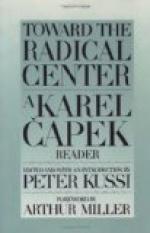|
This section contains 708 words (approx. 3 pages at 300 words per page) |

|
SOURCE: A review of Apocryphal Stories, in Slavic and East European Journal, Vol. 20, No. 2, Summer, 1976, pp. 199-200.
Below, Iggers recognizes both humorous and serious elements in Čapek's Apocryphal Stories.
Karel Čapek is known in America, if at all, as the writer of R.U.R., the expressionistic play in which mankind narrowly escapes the fate of being replaced by robots. The author's concern for the threat of technology to the human environment (and mind) was but one of his many interests, which ranged from human society to insects, from the personality of Thomas Garrigue Masaryk to "philosophical detective stories." The unifying link in Čapek's work, as I see it, is that the surface story is never the main object of his concern; in fact, in a number of his works there is no story. Where there is one, it is only the surface parable through which he expresses...
|
This section contains 708 words (approx. 3 pages at 300 words per page) |

|


